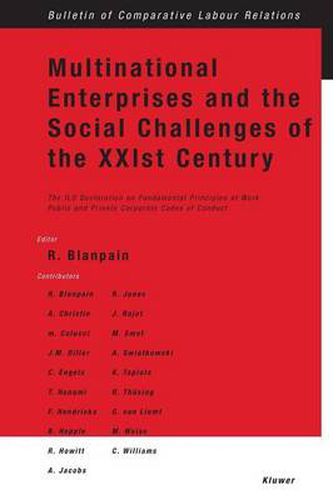Readings Newsletter
Become a Readings Member to make your shopping experience even easier.
Sign in or sign up for free!
You’re not far away from qualifying for FREE standard shipping within Australia
You’ve qualified for FREE standard shipping within Australia
The cart is loading…






This title is printed to order. This book may have been self-published. If so, we cannot guarantee the quality of the content. In the main most books will have gone through the editing process however some may not. We therefore suggest that you be aware of this before ordering this book. If in doubt check either the author or publisher’s details as we are unable to accept any returns unless they are faulty. Please contact us if you have any questions.
Globalization is unravelling and reassembling the fabric of labour relations in ways that are more affected by local conditions and business requirements than by international standards. Drawing together a group of concerned delegates, a special International Conference in Leuven, Belgium, on 2-3 May 1999, was sponsored by the Euro-Japan Institute for Law and Business. The participants included prominent members of the international legal, business and academic communities, as well as representatives of the International Labour Organisation, the Organisation for Economic Development and Co-operation (including its Trade Union Advisory Committee), the European Union, and the International Employers’ Association. This book is the record of this conference. It publishes the reports presented by the various delegates, and also includes the ILO Declaration on Fundamental Principles and Rights at Work (1998) and its follow-up. As an additional feature, it publishes codes of conduct for several multinational enterprises. The text investigates four channels that are available for monitoring social change and promoting social progress in today’s world: labour conventions legally binding on signatory states, international guidelines and statements of social policy imposing voluntary standards on multinational enterprises, international declarations of rights recommending agendas for legislatures, and internal corporate codes of conduct. The reports evaluate the effectiveness of these channels, how they operate in practice, their impact on day-to-day reality, and the extent of coherence and consistency they manifest as instruments of social change.
$9.00 standard shipping within Australia
FREE standard shipping within Australia for orders over $100.00
Express & International shipping calculated at checkout
This title is printed to order. This book may have been self-published. If so, we cannot guarantee the quality of the content. In the main most books will have gone through the editing process however some may not. We therefore suggest that you be aware of this before ordering this book. If in doubt check either the author or publisher’s details as we are unable to accept any returns unless they are faulty. Please contact us if you have any questions.
Globalization is unravelling and reassembling the fabric of labour relations in ways that are more affected by local conditions and business requirements than by international standards. Drawing together a group of concerned delegates, a special International Conference in Leuven, Belgium, on 2-3 May 1999, was sponsored by the Euro-Japan Institute for Law and Business. The participants included prominent members of the international legal, business and academic communities, as well as representatives of the International Labour Organisation, the Organisation for Economic Development and Co-operation (including its Trade Union Advisory Committee), the European Union, and the International Employers’ Association. This book is the record of this conference. It publishes the reports presented by the various delegates, and also includes the ILO Declaration on Fundamental Principles and Rights at Work (1998) and its follow-up. As an additional feature, it publishes codes of conduct for several multinational enterprises. The text investigates four channels that are available for monitoring social change and promoting social progress in today’s world: labour conventions legally binding on signatory states, international guidelines and statements of social policy imposing voluntary standards on multinational enterprises, international declarations of rights recommending agendas for legislatures, and internal corporate codes of conduct. The reports evaluate the effectiveness of these channels, how they operate in practice, their impact on day-to-day reality, and the extent of coherence and consistency they manifest as instruments of social change.